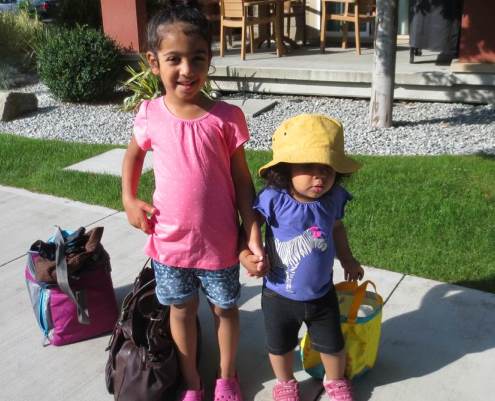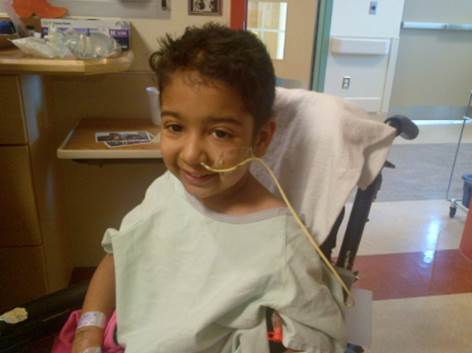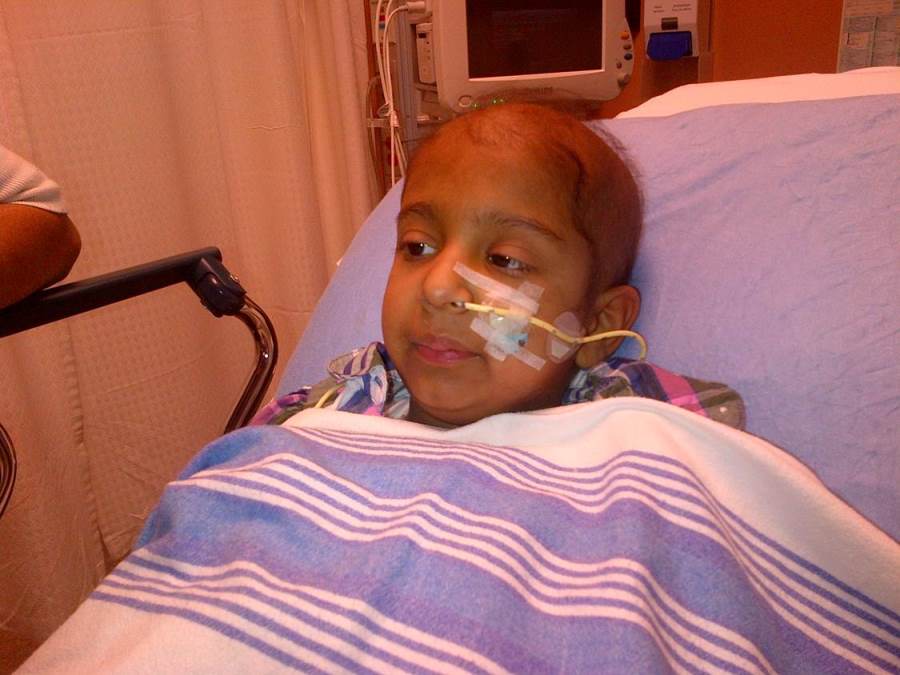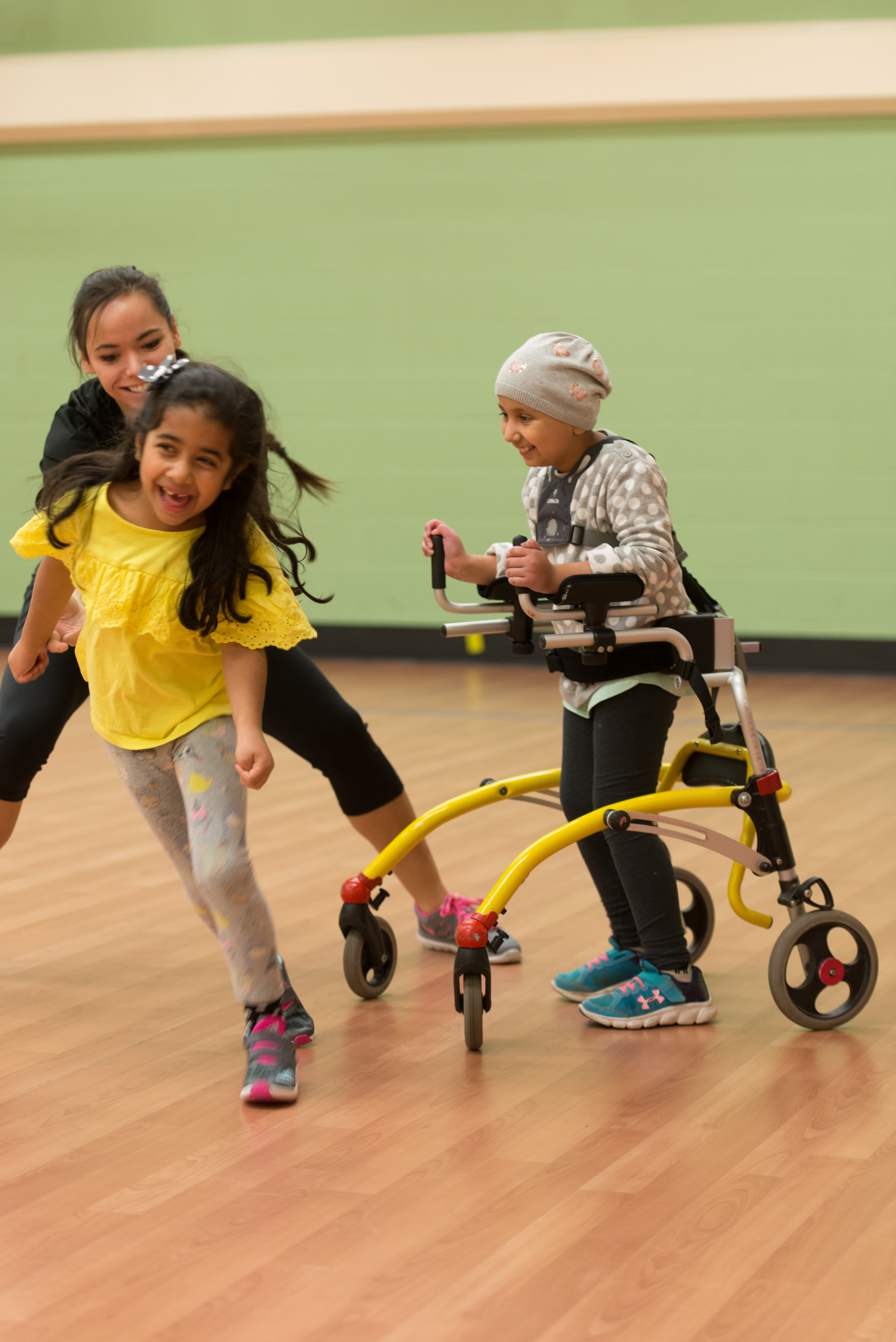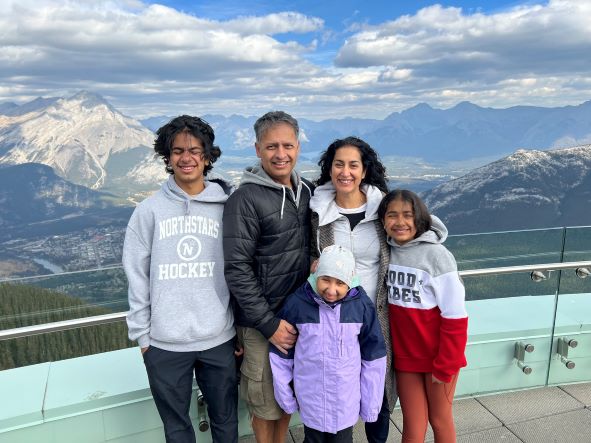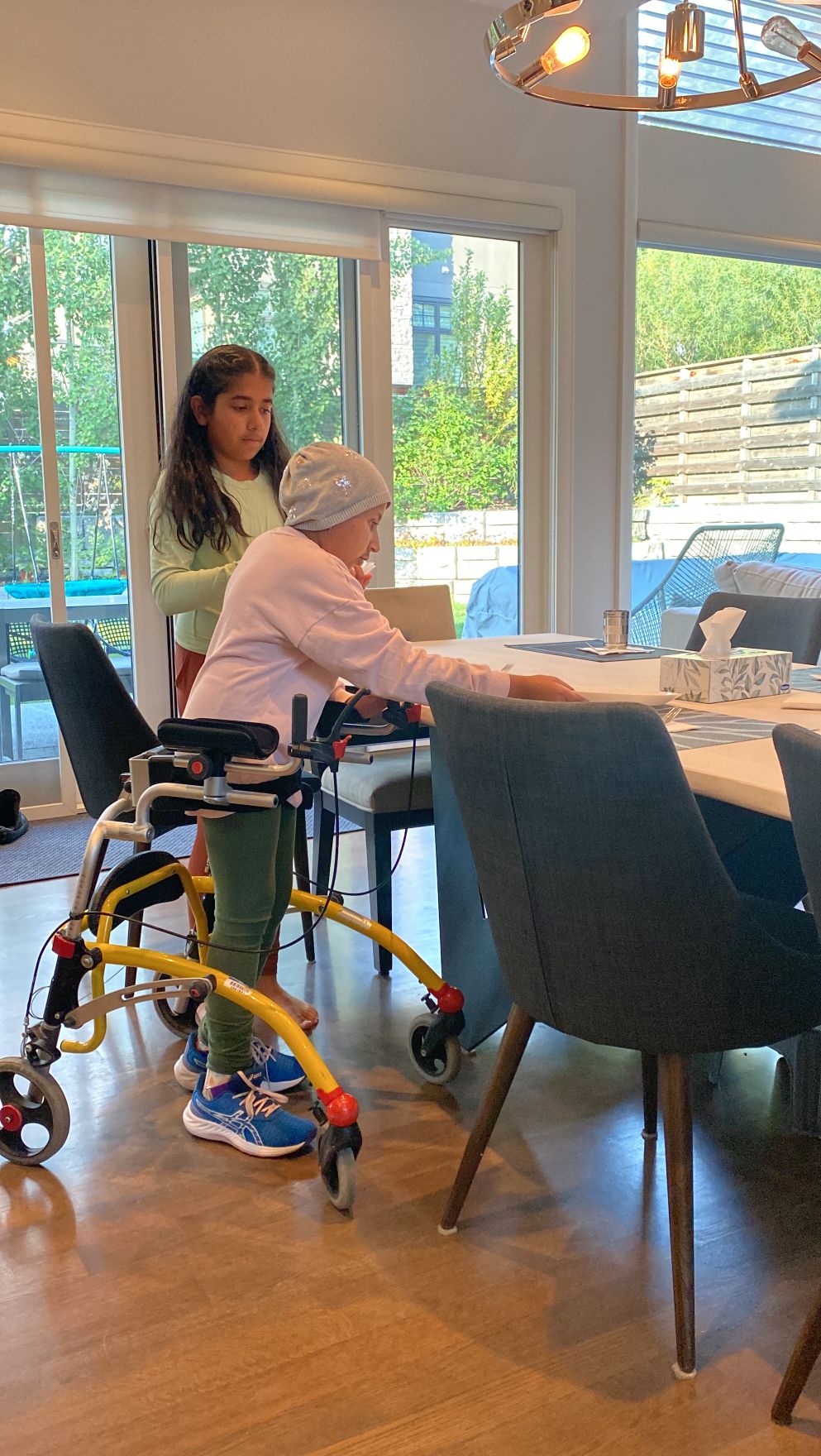Our journey with childhood cancer began when Sofia was just four years old. The memories we had made until that point were really blissful, and when I look back at them now, they almost seem like a fairy-tale.
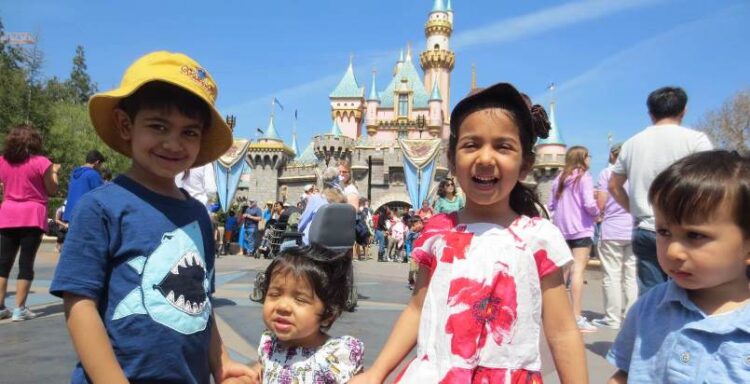
Sofia was starting to blossom into a beautiful and caring little girl. She was always happy to play with her big brother Shaan and was already showing an incredibly nurturing and loving nature with her younger sister Sonya, who was two at the time.
The lovely and delicate Miss Sofia was very sensitive, and was actually afraid of Santa Claus the first time he came to daycare, although she conquered her fears the following year and was able to sit on his lap without crying.
One day at a soccer practice, Sofia stumbled and fell, but what was unusual was she began to vomit. We were reassured by many that day and in the following weeks that her symptoms were not that unusual, given that there were viruses circulating and that the chances of them representing something more sinister were low.
Perhaps I was in denial, but I tried to rationalize these events each day after that first fall. Being physicians, both myself and my wife Shelly, recognized that there were other possible explanations, and while Shelly was pushing for more investigation, I tried to play the reassuring father and husband , hoping and praying that the symptoms would resolve.
But they didn’t. Even on the day of the MRI, when Sofia was still able to do a somersault in gymnastics and after being examined by pediatricians with absolutely no abnormal findings, I felt confident that they were going to reassure us that everything was fine and there was nothing to worry about.
I will never forget that moment, coming out of the MRI suite when the technician directed me toward a room where Shelly was sitting, waiting for me to return. Shelly had already been devastated by the images and what the radiologist had said. The images revealed a massive brain tumour, which we later confirmed as a group 3 metastatic medulloblastoma – one of the worst and most aggressive forms of childhood brain cancer.
Our world came crashing down in an instant.
While I am not a neurologist or oncologist, after seeing the images myself, I knew that life would never be the same, and that Sofia was destined for a long and painful journey that was only just beginning.
What followed was a whirlwind of events, many of which I have blocked from my memory, I’m sure as a defense mechanism. After the emergency surgery to remove the bulk of the primary tumour, Sofia suffered from posterior fossa syndrome, or cerebellar mutism. This meant that she could not move, talk, walk, or even see to interact with us. She must have been so terrified in those initial days, waking up in that state, with tubes all over, and not being able to do anything but cry.
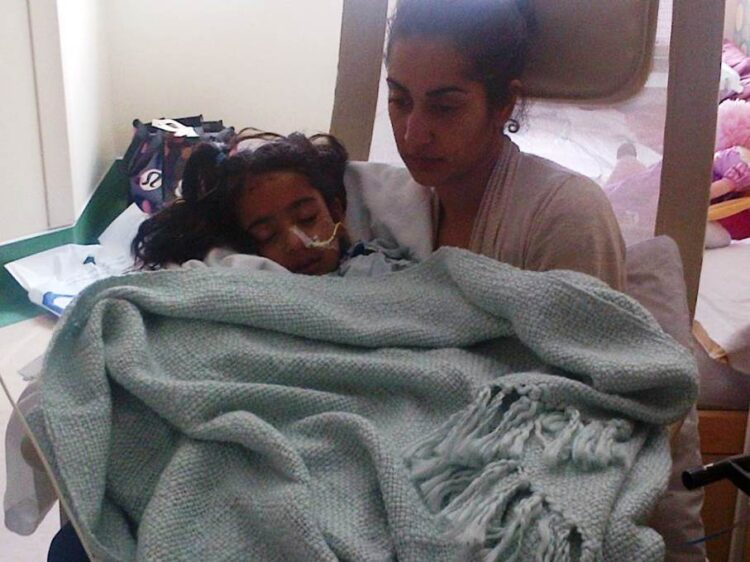
Shelly and I faced life-altering decisions about further treatments with chemotherapy and radiation while helping her to rehabilitate and learn how to move again. Sofia did slowly start to recover, and I remember that it was on Father’s Day on the oncology ward when I was pushing her around in a wheelchair that she started to show signs of movement again – the best Father’s Day present I could hope for.
Over the next six months, we struggled through one of the most aggressive chemotherapy regimens possible in the hopes of eliminating the cancer so we could minimize craniospinal radiation, the side effects of which we had researched in excruciating detail.
The whole family temporarily moved to Houston where Sofia received proton radiation at the MD Anderson Cancer Centre. We were hopeful that we could overcome the cancer with this final leg of therapy with a low-dose approach. Unfortunately, Sofia didn’t seem to be able to catch a break. The cerebrospinal fluid still showed cancer cells even after the ‘atom bomb’ of chemotherapy she had suffered through. This meant we had no choice but to give her the high-dose radiation. The radiation caused significant cerebellar and further brain damage, and this has affected many different functions that will remain significant issues for the rest of her life.
Throughout all of these treatments, Sofia seemed so brave, strong, and accepting. Our hearts hurt with every needle poke, NG tube, and toxic therapy she received, but she endured. And although she has had a number of complications since, she has maintained that lovely, delicate, and caring charisma that she has always had, and that draws people to her. The challenges that she has been left to deal with include hearing, balance, motor skills, speech, and cognition.
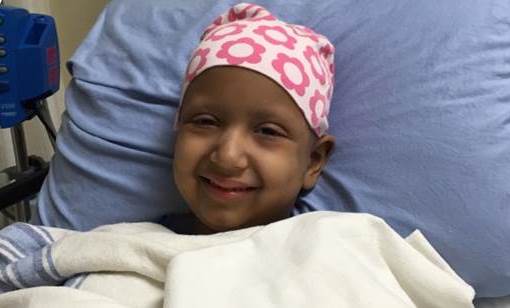
With the support of many specialists, Sofia has made a lot of progress over the years. She has relearned to feed herself and to walk with a walker. Her language skills have also improved. She understands more and is better able to follow conversations.
With all of her ongoing challenges, Kids Cancer Care’s PEER program and Education Support Programs are outstanding resources that are helping Sofia on her long road to recovery.
PEER is an evidence-based therapeutic exercise and physiotherapy program developed by a multidisciplinary team of researchers at the University of Calgary and the Alberta Children’s Hospital.
For two hours each week, Sofia engages in therapeutic exercise at PEER. She works one-to-one with Kids Cancer Care’s Ph.D. exercise specialist to build her bone mass, core strength, balance, flexibility, muscular and cardiovascular capacity, and her overall physical literacy. PEER also offers enormous social benefits. Both of our daughters attend PEER and they have a great time being active together while connecting with other kids.
Sofia is also receiving tutoring support through the Education Support Program at Kids Cancer Care. She and her tutor work diligently on her math and reading skills, filling a critical gap not met through school or other therapeutic services. But it isn’t only for academic gain. Sofia’s tutor is amazing and helps her so much. They had a strong bond and that connection really motivate Sofia to work even harder.
Sofia just started junior high, which means she had to move to a new school. Navigating this transition and finding the right school with the right support has been challenging to say the least. She was just starting to feel settled in her new school when she fell and suffered a concussion. She also fractured her hip but is healing nicely. Kids Cancer Care’s education support specialist is helping us to navigate the education system so we can ensure Sofia is receiving the right support moving forward.
Sofia will always have to work exceedingly hard for the smallest of gains and as hard as she works, she will never be fully independent. Shelly and I worry about Sofia when we’re gone. Our goal is to help her become a little more independent each day.
Everyone in the family helps with Sofia’s care and support. As Shaan and Sonya mature, they are taking on more responsibility. Sonya helps with her morning and evening medications while Shaan gives Sofia her daily growth hormone injection.
Shaan and Sonya also enjoy social time with their sister. They’ve learned to make sure her hearing aids are in before speaking to her and they are always so gentle with her. Sonya plays tummy-time games with Sofia to help build her core and Shaan reads her a bedtime story each night. Shaan is now 14 and is able to babysit. He understands that he can never leave her side. His focus has to be 100 per cent on Sofia.
While Shelly and I are extremely proud of our children, we worry about the toll that caregiving may have on them. We want them to have responsibilities and to understand they need to help their sister. But we don’t want them to feel burdened by it. We want them to have a normal childhood too. We want them to love being with Sofia.
Spending time together as a whole family is not as easy as it may seem. It can be hard to do activities together as Sofia can’t always do what the others can and not everyone wants to do crafts.
We worry about Sofia’s isolation.
This is where Kids Cancer Care has really helped a lot. Their programs and events make family outings and activities easier for families like ours. It means a lot to our family to attend these events – from Camp Kindle in the summer, theatre nights, and to the Polar Express train ride in the winter. Kids Cancer Care even helped Sofia go adaptive skiing at COP during Family Ski Day, while her brother and sister also skied. Sofia was out there for two hours. She didn’t want to come in. Check out the video of Sofia adaptive skiing below.
This summer our children also enjoyed a week at Camp Kindle together. For one week, they rediscovered what it means to be free and what it feels like to be “normal” again. They couldn’t quite articulate it but you could tell they felt it. They made friendships and memories they will cherish for years.
These programs and events give our family a chance to create unforgettable memories as a family. They provide a sense of belonging, and help our kids feel that there are people who understand what it’s like to go through this. Most importantly, they help us to cherish every day we have with Sofia, and make new memories with each one.
Our journey was extremely difficult – the weeks and months spent in the hospital – trying to balance the needs of a two-year-old and six-year-old, while doing chemotherapy with another child and moving the family to a different city for treatment. Watching a delicate and defenseless child suffer through the adverse effects of therapies is unbelievably difficult. We were so thankful and felt blessed to have the support of many friends and family in that acute phase, who helped look after the kids and bring us meals and toys among many other things.
There have been many people and organizations that have played a helpful part in getting our family and Sofia to this point, but Kids Cancer Care certainly is unique. They were there from the beginning with Pizza Nights on the oncology ward and have been there ever since. Kids Cancer Care seems to understand that dealing with a disease like this is a long-term issue for the family, and that support is really very important for many months and even years after a major event like this transforms a family.
We are really very grateful for all of the volunteers who help us participate in these programs and events. We are also very grateful to all of the people who support Kids Cancer Care with financial gifts. We thank you for your support of this fantastic organization that has meant so much to us, and want you to know that your help and involvement in Kids Cancer Care has been invaluable for many families. Your generosity and kindness will undoubtedly be felt by many in the future. Thank you.
~ Naushad Hirani, Sofia’s father
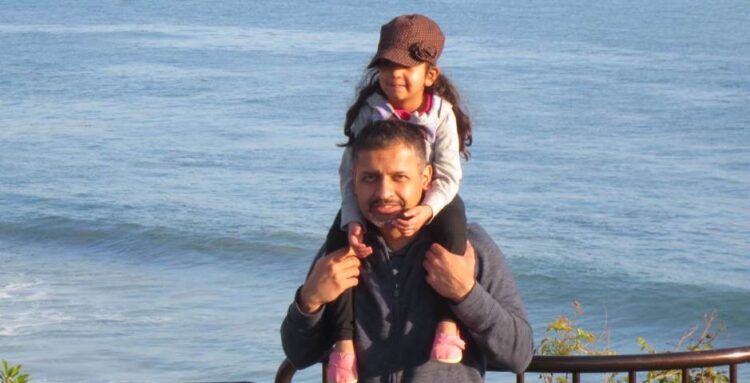
Sofia’s photo gallery

























